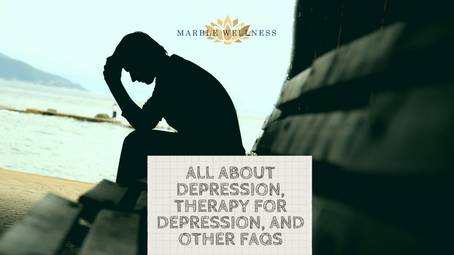I often have people in my life ask me “okay, so I think I’m ready to start counseling. Do you have any recommendations?” I can often help them navigate the process and get to a short-list, at which point they can make a few calls and get an intake session pretty quickly.
(Note: ethically as a therapist, I cannot be a counselor for people I know and have a relationship with. It muddies the work. In some smaller towns or more rural areas, where there might not be many professionals available for counseling, a professional may be able to provide counseling to some people they may know (but still, not a good friend or family member).
But there are plenty of people out there who have made the same decision to start therapy and don’t have a therapist in their life to help guide them in finding a professional that is a good match. Read on for a few tips on how to find someone for your therapy journey.
1. Figure out if you’re going to go the private pay route or if you’ll use your insurance to pay for the sessions. (Helpful hint: you can use your FSA/HSA for therapy sessions!)
a. It may sound crass to tell you that you need to start here, but this is pretty pivotal in how you’ll go about your next steps and will save you a significant amount of time. It would be pretty frustrating to go through several websites, and maybe have a few calls with therapists, before you realize you want to use insurance and they either don’t take insurance or don’t take your provider. That’s time I know you’d rather save. So, get clear on that.
b. Please note that different insurance plans cover mental health differently. In some instances, you may still have to pay the contracted insurance rate until you meet your deductible. In some instances, even with your deductible met, you will have to pay the contracted rate. This is important to consider because many people may want to work with a certain therapist but they then find out that therapist is not paneled with their insurance provider so they move on to a therapist who is. But then they find out they still have to pay out of pocket for that second therapist. In this instance, you may want to take pen to paper and calculate the cost difference between the therapist you originally wanted and the therapist who takes your insurance. It may still be absolutely worth it to meet with the therapist who takes your insurance. But it might not.
c. A note about “superbills.” Many therapists are considered “out-of-network” providers. Meaning they are not paneled with a particular (or in some cases, any) insurance panels. However, they can provide you a “superbill” (healthcare term for “receipt”, basically) and you can submit that to your insurance. Some health insurance plans will partially reimburse you for sessions with an out-of-network provider. This is important to know because if they reimburse you some money, what you end up paying for that out-of-network therapist could be close to the same as what you might pay with your copay for a different therapist or what you might owe out-of-pocket until you meet your deductible. It usually just takes one call to your insurance provider to get these questions answered. And once you have the information, you may find you have a wider range of choices in therapists, which can feel good! Click here for a list of questions to ask your insurance so you can get the real information about your out-of-network mental health coverage.

2. If you feel comfortable asking friends, family, or coworkers, go ahead and ask if they know anyone! They have maybe been to therapy themselves or know a therapist or their good friend went and LOVED their counselor. At this stage, it’s just about narrowing your list; getting names from people in your support group means that there is a least some personality similarities happening that might set you up to also be a good match with the referrals you’re getting.
a. I do recommend not automatically thinking someone else’s great match will be the same for you. There is a chance it will be; but remember, this is about building your list.
3. Ask your primary care doctor, OBGYN, chiropractor, or any other health professional you work with. They have heard from patients in the same spot as you and have probably gotten honest feedback about the therapists in the community. They’ll have a few names to give you. And it may feel safer for you to ask another professional instead of someone in your personal network.
4. Hop on www.psychologytoday.com. It’s an online directory of mental health professionals. You can search by location (city or zip code—consider where you want to get therapy! For example, if you’re going during the work day, maybe put your office zip code; if going in the evenings or maybe on the weekends, you may prefer using your home zip code) and then filter from there. Filters include: insurance type; age; issues; and more! Each therapist’s page features a short statement about their practice and areas of expertise. You can start to get a feel of who to put on your short list! This is what my Psychology Today profile looks like.
5. Therapist’s websites are linked from Psychology Today, or you can visit websites from Google searches, or when you type in the names of the referrals you got from friends and professionals. Take a look around the website—you’ll probably get a feel! I also recommend reading some of the blogs (if the therapist has one) because you can continue to get a sense of their voice.

6. Call and ask to talk for a few minutes before moving forward with setting up a first session! In fact, almost all therapists offer a FREE 15-20 minute consultation call. They want to hear about the reasons you’re seeking therapy to make sure they are a good match for you (for example, if you’re going to therapy for grief counseling but they haven’t done much of that, they are quickly going to make sure to tell you that! Therapists don’t want you to come in and not get better from the process, I promise!) and to also tell you a little about themselves and how they work. You’ll get a sense from that conversation if you want to move forward. And you can always say “I am speaking with a few other therapists; can I call you back if I decide I want to schedule with you?” if you still need to finish your research.
7. Remember that just because you go to one session with the therapist you decided on, does not mean you have to go back. It happens sometimes that once you get face-to-face the relationship just isn’t right. Try a second person! It’s ok. You won’t be the first client to only go to one session and you won’t be the last. *That said, know that a first session isn’t going to be the magical formula to you feeling better immediately. The first session is really about gathering information about you. Therapy can bloom all sorts of ways from there.*
Did I miss any major questions you have? Feel free to reach out if you have anything else you want answered about how to find a therapist!
Talk to you soon!
Start Therapy for Mental Health in St. Louis
If you live in St. Louis and are ready to improve your mental health, we are here to help.
Contact Us!

Additional Counseling Services at Marble Wellness in St. Louis, MO and Chicago, IL
Counseling services designed to help set you on a path of living a more fulfilled, calm, and happy life.
St. Louis
Our St. Louis team of therapists have a variety of training backgrounds and areas of expertise. We specialize in anxiety, depression, grief, chronic illness, therapy for men, couples, and maternal overwhelm. We can also help new moms with various postpartum concerns, moms in the thick of parenting, and moms with teens. We can also chat from wherever you are in the state with online therapy in Missouri and online therapy in Illinois. No matter where you are in your journey, we would love to support you.
Chicago
Our Chicago team of therapists offer a wide range of mental health services to help our clients through the different challenges and hurdles in their life. In addition to anxiety, depression, grief, therapy for men, and maternal overwhelm, we are specialized in professional burnout, therapy for breakups, and love partnering with working moms.



